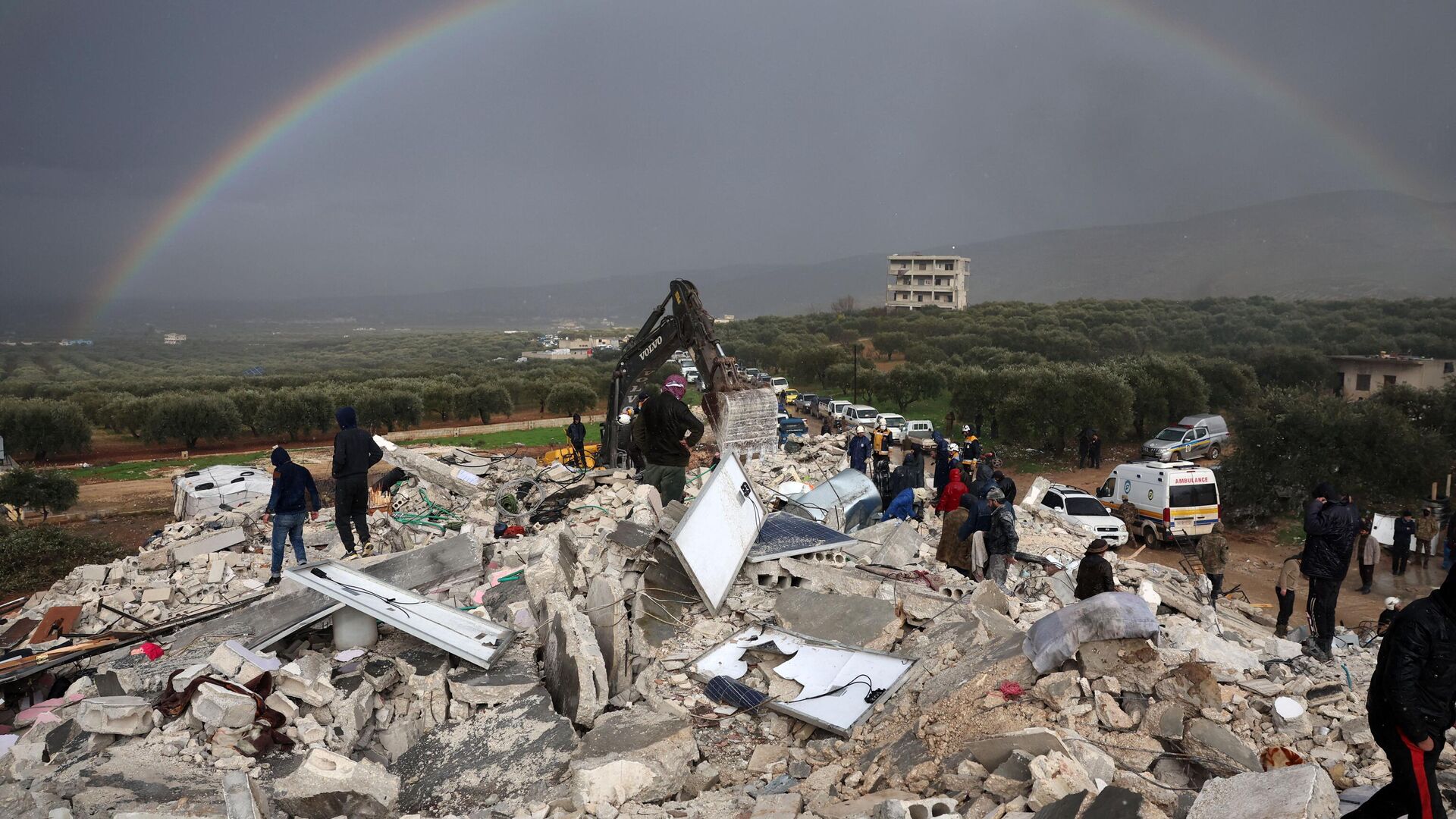https://sputnikglobe.com/20230207/us-cries-crocodile-tears-about-quakes-impact-on-syria-while-keeping-crushing-sanctions-in-place-1107048120.html
US ‘Cries Crocodile Tears’ About Quakes’ Impact on Syria While Keeping Crushing Sanctions in Place
US ‘Cries Crocodile Tears’ About Quakes’ Impact on Syria While Keeping Crushing Sanctions in Place
Sputnik International
Monday’s devastating earthquakes killed hundreds of Syrians and shattered critical infrastructure already battered by the West’s decade-long dirty war. Washington has refused to budge on its sanctions policy.
2023-02-07T15:27+0000
2023-02-07T15:27+0000
2023-02-09T13:08+0000
analysis
syria
earthquakes
sanctions
us sanctions
caesar syrian civilian protection act
earthquake
https://cdn1.img.sputnikglobe.com/img/07e7/02/07/1107031711_0:160:3072:1888_1920x0_80_0_0_1f151bd130f4632534642cc2695ab829.jpg
The United States will not be lifting its Caesar Act sanctions or other restrictions against Syria following Monday’s quakes, State Department spokesman Ned Price has indicated.“First, I would like to start today by echoing the president and secretary in expressing our deepest condolences to the people of Turkey and Syria following the devastating earthquakes in Kahramanmaras, in southeastern Turkey,” Price said in a briefing Monday. “We stand in solidarity with our allies, our partners, and the people of Turkey and Syria affected by those terrible events.”Price clarified that this “solidarity” doesn’t extend to the Syrian government. Asked why Washington wasn’t ready to coordinate aid with Damascus directly, the spokesman suggested that it “would be quite ironic, if not counterproductive, for us to reach out to a government that has brutalized its people over the course of a dozen years now.”Instead, according to Price, the US will be working with “NGO partners on the ground,” who, “unlike the Syrian regime, are there to help the people rather than brutalize them.” The spokesman did not elaborate on just who these “partners on the ground” were, except to say that they will “need to have access to be able to go back and forth across the border” to provide help.What is the Caesar Act?Syria is being suffocated by Western sanctions, including the "Caesar Syria Civilian Protection Act," better known simply as the Caesar Act, a major piece of US legislation passed in late 2019 which targets the Syrian government and businesses with severe sanctions, and threatens punitive measures against any foreign individuals, businesses or countries cooperating with Damascus. While touted as being intended to “punish” the Syrian government and President Bashar Assad for “war crimes” against the Syrian people, the law has in practice resulted in untold suffering among Syria’s civilian population by blocking imports of essential goods like food, energy, and basic medical supplies and equipment.The Caesar Act is one of dozens of packages of US sanctions against Syria, with restrictions against the country going back as far as 1979. Syria is one of the most heavily sanctioned nations in the world, with over 2,600 sanctions in place against the country by the US and its European allies at this time.The sanctions have served to dramatically worsen the socioeconomic crisis caused by the West’s long-running dirty war in the country, have affected the country’s neighbors and have sparked criticism even from anti-Assad media and governments over their cruel and indiscriminate nature.Late last year, after a 12-day fact-finding trip to Syria, UN Special Rapporteur Alena Douhan urged Washington and its allies to immediately lift all “suffocating” unilateral sanctions against Syrians, saying she had been “struck by the pervasiveness of the human rights and humanitarian impact of the unilateral coercive measures” imposed against the country.‘Crocodile Tears’“It has been clear for a long time that the US is more interested in regime change in Syria than in the welfare of the Syrian people,” Ford emphasized. “The cruel sanctions impact far more on ordinary citizens than on the Syrian government.”NGOs Can’t Match Effectiveness of the State in Aid DistributionDr. Imad Salamey, an associate professor of political science at the Lebanese American University, agrees that ignoring the Syrian government’s existence will limit the effectiveness of any US aid to the quake-stricken country.According to Dr. Salamey, the Caesar Act does have exemptions allowing for possible cooperation with Damascus in support of humanitarian relief objectives, but such cooperation “would require decisions from the White House,” which, judging by Price’s remarks, seem unlikely, because President Joe Biden doesn’t want to be taking a soft line on Assad by Washington hawks.Peter Ford offered a more blunt assessment on NGOs, saying the US would “naturally” prefer to continue working in Syria “through its own puppet NGOs like the White Helmets, whose primary purpose is not to help civilians but to whitewash the image of the jihadi controllers of northern Syria and thereby justify the continuing Western support for the armed opposition against the legitimate Syrian government.”"The humanitarian issue shouldn't be politicized...because it's related to the basic needs of human kind," the Syrian political analyst said. Characterizing sanctions as a continuation of the war against Syria "by other tools," Dr. Ibrahim stressed that Syrians have come to learn only too well that the "United States is not concerned about democracy or about human rights or about humanitarian issues. They want only one thing: to put their hands in Syria and topple the government of President Assad, to bring another government [to power] which is loyal to the United States and will apply their agenda in the Middle East." Syrians' hope, he said, is finding rational Americans "who will understand the truth and realities and the facts of the nations and people who refuse to be slaves to other nations."US Intransigence Sparks Bewilderment, CondemnationUS and European silence on the provision of direct support to Syria has sparked criticism from countries, humanitarian agencies, and human rights advocacies around the world.The Syrian branch of the International Committee of the Red Cross has called on the West to urgently lift restrictions. “We call for the lifting of the blockade and economic sanctions imposed on Syria in order to deal with the impact of the devastating earthquake,” Syrian Red Crescent chief Khaled Hboubati said in a press conference Tuesday. “We need heavy equipment, ambulances and fire brigades to speed up search and rescue operations. To do this, it’s necessary to remove sanctions against Syria as soon as possible,” the official urged. The Syrian Red Crescent is ready to take aid from any country, except Israel.The Middle East Council of Churches, a Beirut-headquartered group representing the Middle East’s Christian communities, has also called on the West to lift crushing restrictions and “allow access” for aid, “so that sanctions may not turn into a crime against humanity.”The American-Arab Anti-Discrimination Committee, a US-based grassroots civil rights advocacy, is also calling for sanctions to be lifted, stressing that “time is of the essence” in the provision of “immediate relief to those in need.”Iran – which has already dispatched a planeload of aid including food, medical, and sanitary supplies to Damascus, is calling on the international community to put pressure on Washington to change its course.“The important point is that different countries must exert pressure on the US government to lift the cruel siege of Syria so that international humanitarian aid can be delivered to the quake-stricken people of Syria without any obstacles in the shortest possible time,” Iranian Foreign Ministry spokesman Nasser Kanaani said.Potential Watershed MomentSurprisingly, major Middle Eastern countries have demonstrably refused to toe the US line on post-quake assistance to Syria, with Egypt, Algeria, Tunisia, Iraq, Bahrain, Saudi Arabia, Oman, Qatar and the United Arab Emirates joining traditional Syrian allies Iran and Russia in providing aid, or expressing readiness to do so. On Tuesday, Egyptian President Abdel el-Sisi spoke to President Assad by phone, offering condolences and pledging Cairo’s “full support” for relief efforts. The call was the first of its kind since el-Sisi came to power in 2014.Lebanese military expert and retired general Omar Al-Mughrabi echoed Yousef's sentiments, saying that while the "politicization" of relief efforts demonstrated the "barbaric" "true face of the collective West" in relation to Syria, the apparent unity shown by the leaders of Arab countries by contrast gives rise to questions whether the disaster could become a factor for regional reconciliation, and perhaps even accelerate Damascus's return to the Arab League.Veteran Syrian political commentator Alla Al-Asfari fears the answer is 'no', because the majority of the countries of the Persian Gulf lack the political will to make independent decisions due to US pressure and fear of US wrath, even if they would like to see a rapprochement in ties with Syria.Nonetheless, Al-Asfari stressed the need for a "united Arab position and united actions demanding the lifting of these unfair sanctions so that Syria can continue rescue operations, since hundreds of citizens are still trapped under the rubble while civil defenses are forced to rescue them using simple and primitive tools."Asked to comment on Riyadh's surprise display of solidarity with Damascus in the wake of the quakes, Saudi political scientist and strategic affairs researcher Fawaz Kaseb Al-Enezi told Sputnik Arabic that the kingdom "always separates its humanitarian positions from political ones," with food, medical and financial aid to Syria based on concerns "about Arab national security, which can be threatened by such natural disasters."A 7.7-magnitude earthquake struck southeastern Turkey on Monday morning, with devastation spreading out from the Turkish epicenter into neighboring Syria. A second quake measuring 7.5 on the Richter scale hit several hours later. On Tuesday, a third, 5.5 magnitude quake hit central Turkey. Over 3,500 people in Turkey were killed in the disaster, with 20,000+ injured. Syrian authorities have reported over 800 fatalities and 1,400+ injuries in government-controlled areas of the country as of Tuesday afternoon, with over 700 more people feared dead in Idlib – the Syrian province controlled by US and Turkish-backed jihadists.
https://sputnikglobe.com/20230206/massive-75-magnitude-quake-hits-turkey-1106997080.html
https://sputnikglobe.com/20221208/us-theft-of-syrian-oil-driving-diesel-prices-sky-high-in-areas-of-government-control-1105239001.html
https://sputnikglobe.com/20230206/we-are-afraid-syrian-residents-sleeping-inside-cars-over-risk-of-further-earthquakes-1107024186.html
https://sputnikglobe.com/20230207/hotbed-of-seismic-activity-why-was-the-turkish-earthquake-so-deadly-1107028437.html
https://sputnikglobe.com/20230207/updates-fresh-53-magnitude-earthquake-hits-turkey-as-death-toll-rises-to-2921-1107029250.html
syria
Sputnik International
feedback@sputniknews.com
+74956456601
MIA „Rosiya Segodnya“
2023
News
en_EN
Sputnik International
feedback@sputniknews.com
+74956456601
MIA „Rosiya Segodnya“
Sputnik International
feedback@sputniknews.com
+74956456601
MIA „Rosiya Segodnya“
syria, earthquake, quake, damascus, united states, sanctions, restrictions
syria, earthquake, quake, damascus, united states, sanctions, restrictions
US ‘Cries Crocodile Tears’ About Quakes’ Impact on Syria While Keeping Crushing Sanctions in Place
15:27 GMT 07.02.2023 (Updated: 13:08 GMT 09.02.2023) Monday’s devastating earthquakes killed hundreds of Syrians and shattered critical infrastructure already battered by the West’s decade-long dirty war against the Middle Eastern nation. But Washington has refused to budge on its sanctions, which aptly bear the name of an ancient Roman emperor known for his cruelty.
The United States will not be lifting its Caesar Act sanctions or other restrictions against Syria following Monday’s quakes, State Department spokesman Ned Price has indicated.
“First, I would like to start today by echoing the president and secretary in expressing
our deepest condolences to the people of Turkey and Syria following the devastating earthquakes in Kahramanmaras, in southeastern Turkey,” Price
said in a briefing Monday.
“We stand in solidarity with our allies, our partners, and the people of Turkey and Syria affected by those terrible events.”Price clarified that this “solidarity” doesn’t extend to the Syrian government. Asked why Washington wasn’t ready to coordinate aid with Damascus directly, the spokesman suggested that it “would be quite ironic, if not counterproductive, for us to reach out to a government that has brutalized its people over the course of a dozen years now.”
Instead, according to Price, the US will be working with “NGO partners on the ground,” who, “unlike the Syrian regime, are there to help the people rather than brutalize them.” The spokesman did not elaborate on just who these “partners on the ground” were, except to say that they will “need to have access to be able to go back and forth across the border” to provide help.
Syria is being suffocated by Western sanctions, including the "Caesar Syria Civilian Protection Act," better known simply as the Caesar Act, a major piece of US legislation passed in late 2019 which targets the Syrian government and businesses with severe sanctions,
and threatens punitive measures against any foreign individuals, businesses or countries cooperating with Damascus. While touted as being intended to “punish” the Syrian government and President Bashar Assad for “war crimes” against the Syrian people, the law has in practice resulted in untold suffering among Syria’s civilian population by blocking imports of essential goods like food, energy, and basic
medical supplies and equipment.
The Caesar Act is one of
dozens of packages of US sanctions against Syria, with restrictions against the country going back as far as 1979. Syria is one of the most heavily sanctioned nations in the world, with
over 2,600 sanctions in place against the country by the US and its European allies at this time.
The sanctions have served to dramatically worsen the socioeconomic crisis caused by the West’s long-running dirty war in the country,
have affected the country’s neighbors and have sparked criticism even from anti-Assad media and governments over their
cruel and indiscriminate nature.Late last year, after a 12-day fact-finding trip to Syria, UN Special Rapporteur Alena Douhan
urged Washington and its allies to immediately lift all “suffocating” unilateral sanctions against Syrians, saying she had been
“struck by the pervasiveness of the human rights and humanitarian impact of the unilateral coercive measures” imposed against the country.
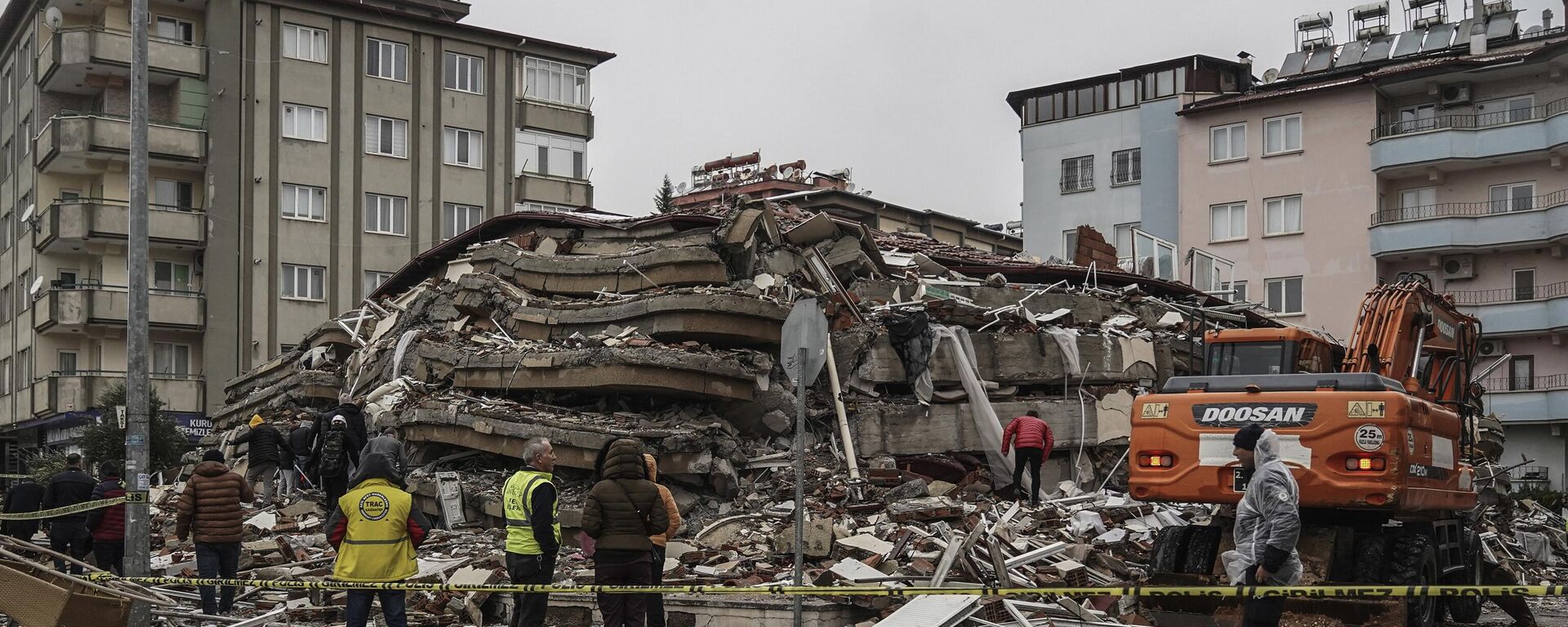
6 February 2023, 02:14 GMT
“In the current situation, suspending sanctions would be an obvious and most helpful action to take for any Western government sincerely desiring to help, rather than posturing, political points scoring and crying crocodile tears,” Peter Ford, Britain’s former ambassador to Syria, told Sputnik after being asked to comment on Price's position.
“It has been clear for a long time that the US is more interested in regime change in Syria than in the welfare of the Syrian people,” Ford emphasized. “The cruel sanctions impact far more on ordinary citizens than on the Syrian government.”
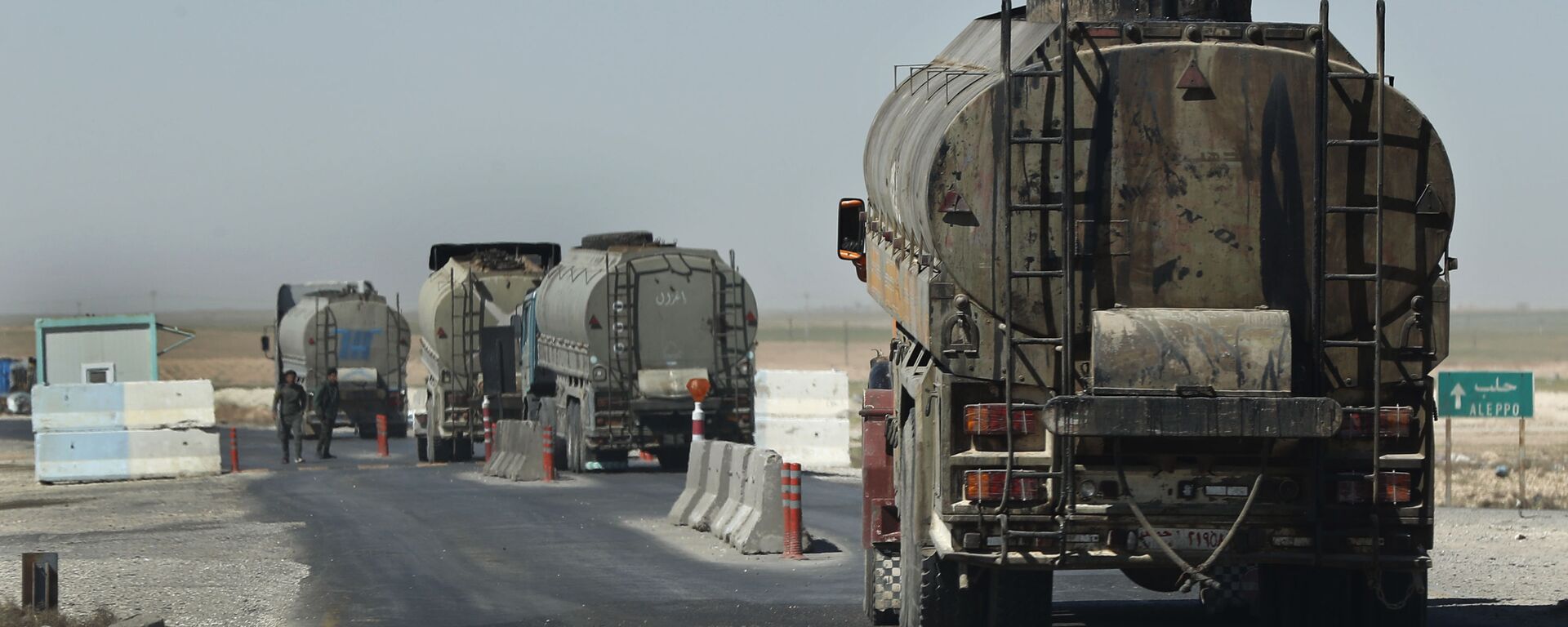
8 December 2022, 17:49 GMT
NGOs Can’t Match Effectiveness of the State in Aid Distribution
Dr. Imad Salamey, an associate professor of political science at the Lebanese American University, agrees that ignoring the Syrian government’s existence will limit the effectiveness of any US aid to the quake-stricken country.
“It’s always better as a general practice to work with the government rather than with different NGOs because the government has centralized power and can provide much more effective coordination,” Salamey explained. “Working with NGOs is an approach with many limitations, because NGOs are usually not accountable for the state as much as they are [to] a donor, and those donors can be foreign entities, so the NGOs end up not necessarily in the interest of the nation, but rather in the interest of the donor. In addition, NGOs are typically small organizations, and they don’t have much capacities to respond to major disasters or to respond to major humanitarian catastrophes,” the professor said.
According to Dr. Salamey, the Caesar Act does have exemptions allowing for possible cooperation with Damascus in support of humanitarian relief objectives, but such cooperation “would require decisions from the White House,” which, judging by Price’s remarks, seem unlikely, because President Joe Biden doesn’t want to be taking a soft line on Assad by Washington hawks.
Peter Ford offered a more blunt assessment on NGOs, saying the US would “naturally” prefer to continue working in Syria “through its own puppet NGOs like the
White Helmets, whose primary purpose is not to help civilians but to whitewash the image of the jihadi controllers of northern Syria and thereby justify the continuing Western support for the armed opposition against the legitimate Syrian government.”
"It is not so clear what kind of NGOs the United States will work through, but when we hear the word 'NGOs' we remember the hands of the CIA, which was working through those NGOs covered by humanitarian issues...or applying a certain agenda of hegemony, espionage and of interference in the internal affairs of other nations," Dr. Taleb Ibrahim, deputy director of the Damascus Center for Strategic Studies, told Sputnik.
"The humanitarian issue shouldn't be politicized...because it's related to the basic needs of human kind," the Syrian political analyst said. Characterizing sanctions as a continuation of the war against Syria "by other tools," Dr. Ibrahim stressed that Syrians have come to learn only too well that the "United States is not concerned about democracy or about human rights or about humanitarian issues. They want only one thing: to put their hands in Syria and topple the government of President Assad, to bring another government [to power] which is loyal to the United States and will apply their agenda in the Middle East." Syrians' hope, he said, is finding rational Americans "who will understand the truth and realities and the facts of the nations and people who refuse to be slaves to other nations."
Ford characterized the State Department’s stance on direct aid as “the height of callousness,” stressing that “the most practical and effective course for delivering assistance” would be state-to-state support. “The US, with its ‘triple no’s’ of no sanctions lifting, no contact with the legitimate authorities and no coordination with them is clearly behaving hypocritically and selfishly,” Ford concluded.
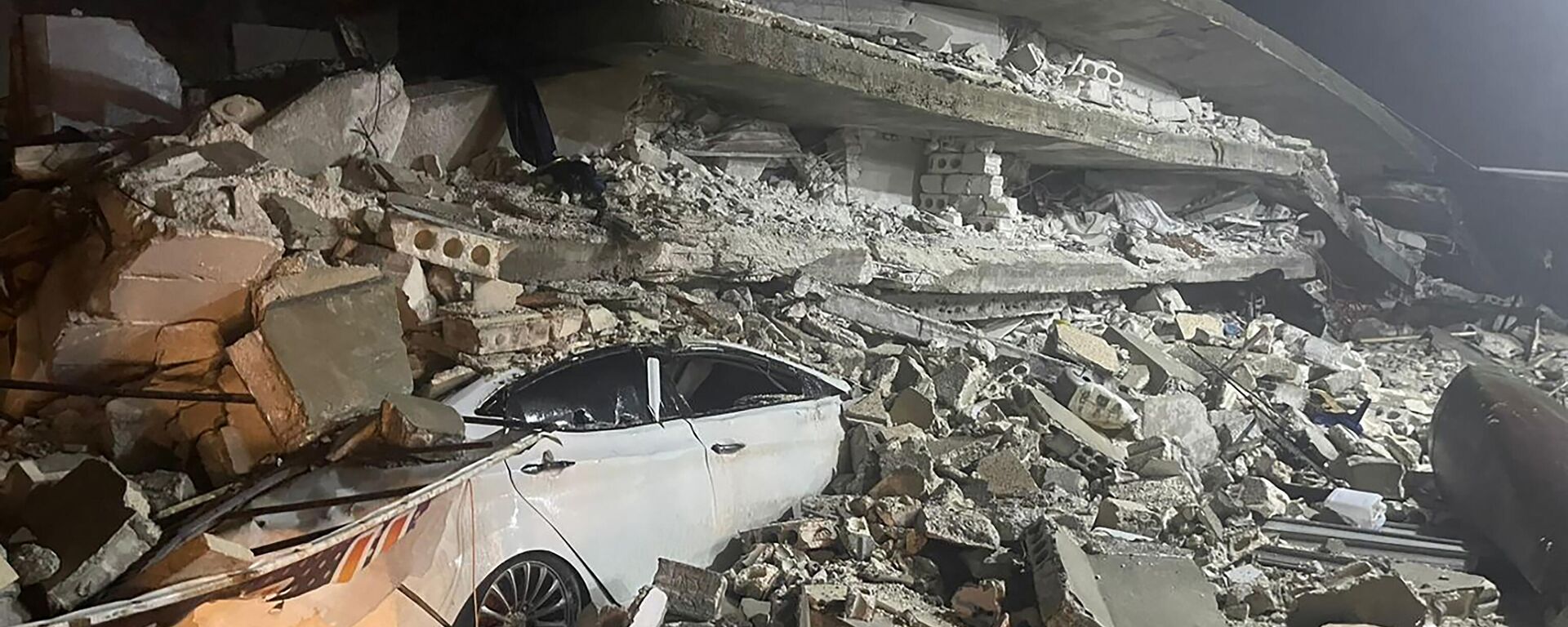
6 February 2023, 20:17 GMT
US Intransigence Sparks Bewilderment, Condemnation
US and European silence on the provision of direct support to Syria has sparked criticism from countries, humanitarian agencies, and human rights advocacies around the world.
The Syrian branch of the International Committee of the Red Cross has called on the West to urgently lift restrictions. “We call for the lifting of the blockade and economic sanctions imposed on Syria in order to deal with the impact of the devastating earthquake,” Syrian Red Crescent chief Khaled Hboubati said in a press conference Tuesday. “We need heavy equipment, ambulances and fire brigades to speed up search and rescue operations. To do this, it’s necessary to remove sanctions against Syria as soon as possible,” the official urged. The Syrian Red Crescent is ready to take aid from any country, except Israel.
The Middle East Council of Churches, a Beirut-headquartered group representing the Middle East’s Christian communities, has also
called on the West to lift crushing restrictions and “allow access” for aid,
“so that sanctions may not turn into a crime against humanity.”The American-Arab Anti-Discrimination Committee, a US-based grassroots civil rights advocacy, is also calling for sanctions to be lifted,
stressing that “time is of the essence” in the provision of “immediate relief to those in need.”
Iran – which has already dispatched a planeload of aid including food, medical, and sanitary supplies to Damascus, is calling on the international community to put pressure on Washington to change its course.
“The important point is that different countries must exert pressure on the US government to lift the cruel siege of Syria so that international humanitarian aid can be delivered to the quake-stricken people of Syria without any obstacles in the shortest possible time,” Iranian Foreign Ministry spokesman Nasser Kanaani
said.
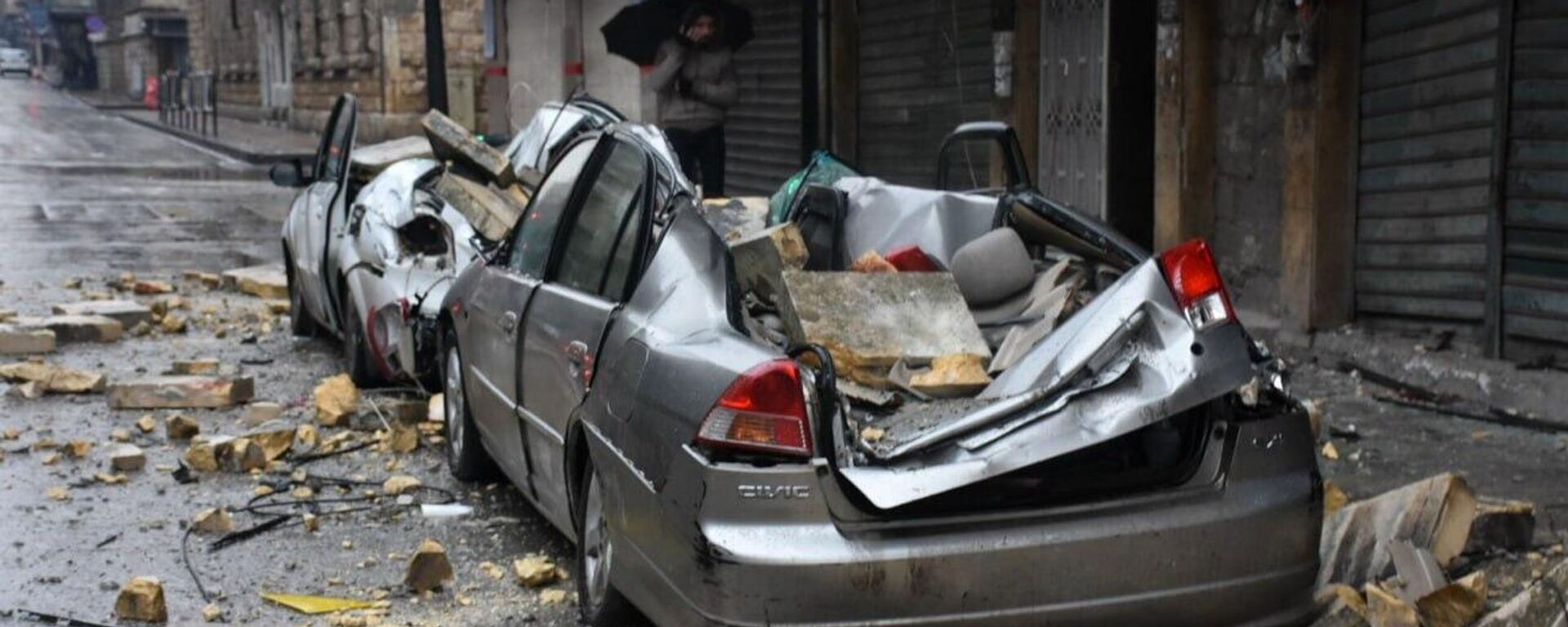
7 February 2023, 03:23 GMT
Potential Watershed Moment
Surprisingly, major Middle Eastern countries have demonstrably refused to toe the US line on post-quake assistance to Syria, with Egypt, Algeria, Tunisia, Iraq, Bahrain, Saudi Arabia, Oman, Qatar and the United Arab Emirates joining traditional Syrian allies Iran and Russia in providing aid, or expressing readiness to do so. On Tuesday, Egyptian President Abdel el-Sisi spoke to President Assad by phone, offering condolences and pledging Cairo’s “full support” for relief efforts. The call was the first of its kind since el-Sisi came to power in 2014.
Commenting on these developments, Syrian political scientist Hassan Yousef told Sputnik Arabic that the "humanitarian aid delivered by all these countries could become an important starting point for improving relations between all Arab countries in the region," and for mending ties between Damascus and nations which had once joined forces with Washington in trying to overthrow the Assad government.
Lebanese military expert and retired general Omar Al-Mughrabi echoed Yousef's sentiments, saying that while the "politicization" of relief efforts demonstrated the "barbaric" "true face of the collective West" in relation to Syria, the apparent unity shown by the leaders of Arab countries by contrast gives rise to questions whether the disaster could become a factor for regional reconciliation, and perhaps even accelerate Damascus's return to the Arab League.
Veteran Syrian political commentator Alla Al-Asfari fears the answer is 'no', because the majority of the countries of the Persian Gulf lack the political will to make independent decisions due to US pressure and fear of US wrath, even if they would like to see a rapprochement in ties with Syria.
Nonetheless, Al-Asfari stressed the need for a "united Arab position and united actions demanding the lifting of these unfair sanctions so that Syria can continue rescue operations, since hundreds of citizens are still trapped under the rubble while civil defenses are forced to rescue them using simple and primitive tools."
Asked to comment on Riyadh's surprise display of solidarity with Damascus in the wake of the quakes, Saudi political scientist and strategic affairs researcher Fawaz Kaseb Al-Enezi told Sputnik Arabic that the kingdom "always separates its humanitarian positions from political ones," with food, medical and financial aid to Syria based on concerns "about Arab national security, which can be threatened by such natural disasters."
A 7.7-magnitude earthquake struck southeastern Turkey on Monday morning, with devastation spreading out from the Turkish epicenter into neighboring Syria. A second quake measuring 7.5 on the Richter scale hit several hours later. On Tuesday, a third, 5.5 magnitude quake hit central Turkey. Over 3,500 people in Turkey were killed in the disaster, with 20,000+ injured. Syrian authorities have reported over 800 fatalities and 1,400+ injuries in government-controlled areas of the country as of Tuesday afternoon, with over 700 more people feared dead in Idlib – the Syrian province controlled by US and Turkish-backed jihadists.
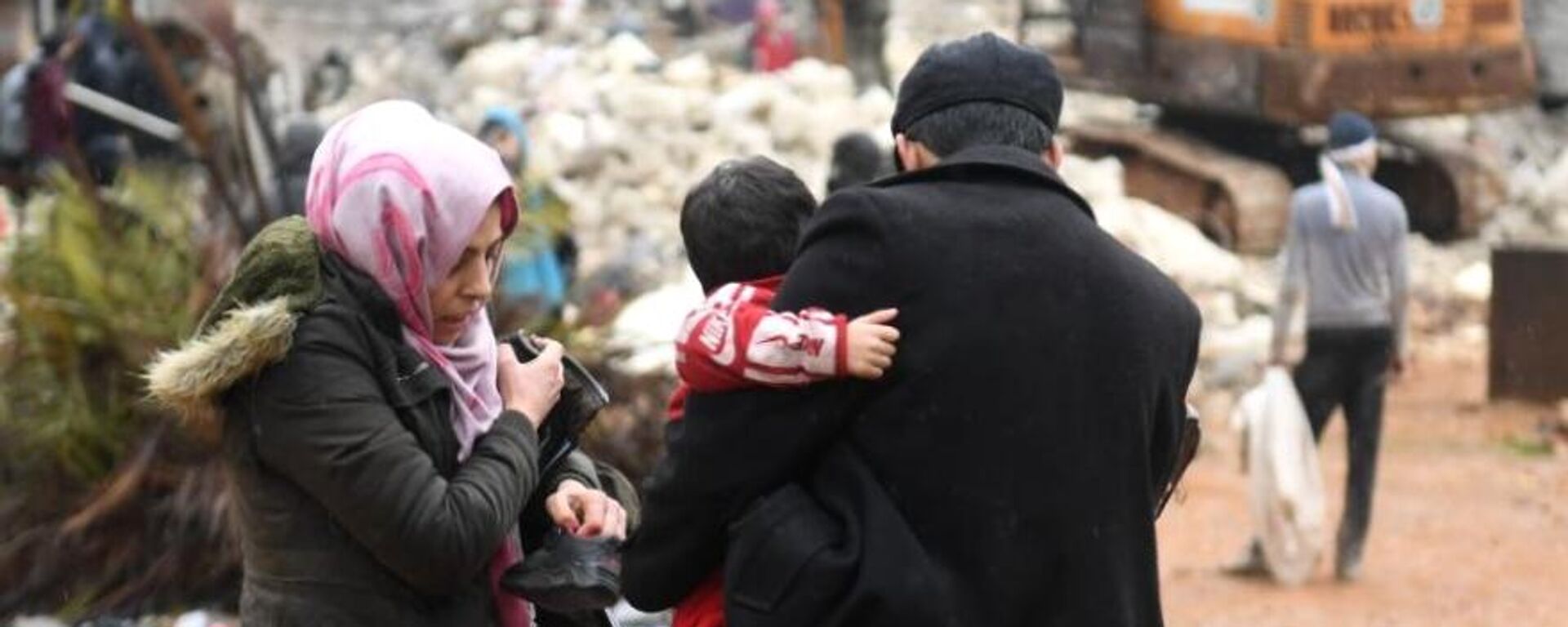
7 February 2023, 04:40 GMT
